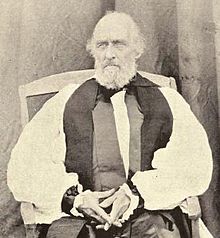William Bompas
| William Carpenter Bompas | |
|---|---|
 |
|
| Born |
January 20, 1834 Regent's Park, London |
| Died | June 9, 1906 (aged 72) Carcross, Yukon |
| Nationality | British |
| Known for | First Bishop of Athabasca, Mackenzie River and Selkirk |
William Carpenter Bompas (20 January 1834 – 9 June 1906) was a Church of England clergyman and missionary in northwestern Canada, first Anglican bishop of the Athabasca diocese, then of the Mackenzie River diocese and then of the Selkirk (Yukon) diocese as these dioceses were successively carved out of the original Rupert's Land diocese. Born in London, England, he died in Carcross, Yukon. His wife Charlotte Selina (Cox) Bompas participated in his missionary work, and wrote Owindia: A True Tale of the Mackenzie River Indians, North-West America.
William Carpenter Bompas was born on January 20, 1834 at Regent's Park, London to father Charles and mother Mary Steele. It is thought that Charles Carpenter Bompas served as the inspiration for Charles Dickens' Buzfuz in The Pickwick Papers. It is thought that Bompas' heritage lay in France, although members of the extended family resided in the United States and the United Kingdom. From 1844, a string of family deaths left the family in poor circumstances. When William was aged ten, in February 1844, his father Charles died, leaving his eight children. His eldest son, also named Charles, died in 1847.
William's early education was supplied by a graduate of Cambridge University. Partly due to his private tuition and a lack of socialisation, William was considered a shy boy, and in his spare time preferred to sketch buildings such as churches instead of participate in games. His tutor, a Mr. Elliott, believed Bompas to be of high intellect, writing:
I never had a pupil who made such acquisitions of knowledge in so short a time; his attainments in mathematics and classics are far beyond the majority of youths at his age, and would warrant anyone conversant with the state of education in the Universities in predicting a brilliant career for him, should he ever have that path open to him. I think, however, that the development of his mind is still more remarkable than the amount of his knowledge.
...
Wikipedia
